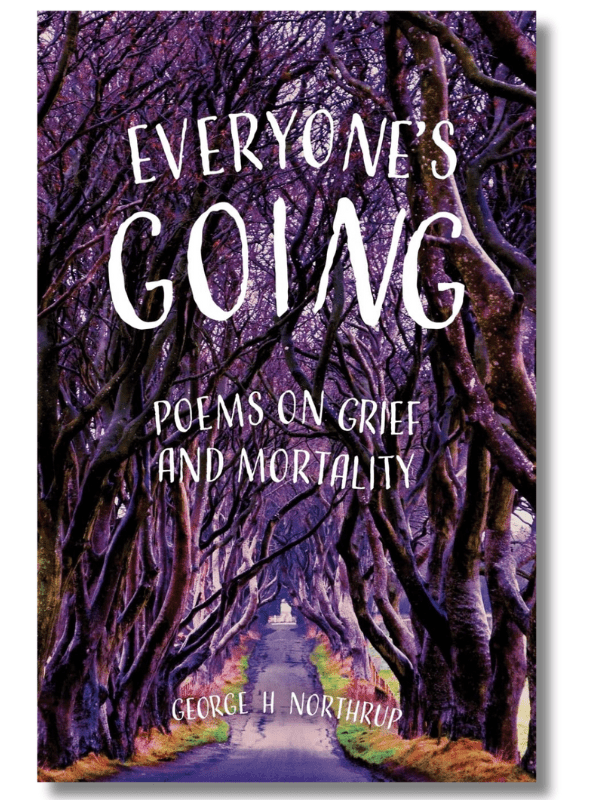Everyone’s Going
by George H. Northrup
Genre: Poetry
ISBN: 9798891326842
Print Length: 100 pages
Publisher: Atmosphere Press
Reviewed by Nikolas Mavreas
A collection of healing laments about loss and grief presented in dazzling verse
George Northrup is an experienced poet and psychologist, qualifications that are evident in his latest collection, Everyone’s Going: Poems on Grief and Mortality. More evident still is the fact that here is a poet who loves poetry and who is concerned with the crafting of language, not only as a means to an end but also as a means to some kind of beginning.
Northrup writes about grief and mortality—there is no point trying to paraphrase the book’s perfectly accurate subtitle—through a personal point of view, whether real or assumed as speaker, commenting on the experience of losing a father, a mother, and a partner. His poems are like alloys, with great lyricism mixed with memoiric narrative detail, not just seamlessly but inseparably.
The poet draws a tragically accurate picture of illness in old age, with sudden bursts of actuality that can unsettle. For example, the old man says the following to the son during a visit at the rehabilitation center:
“‘Do not be fooled,’ he said, ‘by polished floors and costly doors.’
He showed me his diaper, the feeding tube that pierced his gut.”
The contrast between the two images is enhanced by the contrasting character of the lines: the first smoothed by the perfectly symmetrical, the second plunging into violent staccato. Northrup is a bard who can modulate his tone and style, such as when the lines above gradually turn into the almost Elizabethan “Another almost-ghost in fitful sleep.”
The idea of experiencing a lost loved one through the objects they left behind is explored a few times, to undiminishing effect. A gardenia with which the son surprises his widowed mother ends up being damaged by overwatering—that is, by too much care—which leads to this remarkable thought after she is gone:
“I considered repotting my gardenia,
tilted upright to look less like an amputee.
But I have come to prefer this injured way,
holding all that was perishable between us.”
If you detect a hint of Philip Larkin in that, you are not mistaken. Larkin’s epigraph might be saved for last—following others from Rilke, Dickinson, Eliot, Williams, Dante, and more—perhaps to signify the deeper influence. Echoes of Larkin ring beautifully throughout, such as in the beginning of the penultimate stanza of “Throwing It All Out.” Moreover, compare the last stanza of Larkin’s “Faith Healing” to the following lines from Northrup’s poem titled “Late-Stage American Hegemony:”
“Some believe in progress,
others in a lumbering pendulum that swings between prosperity and want, peace and war.”
Toward the end of the book, the poet turns to consideration of his own mortality, becoming more philosophical, with the language seeming markedly more abstract. It is a moving conclusion, not at all naive, as we still sense the apathy that always threatens to creep in.
The opening epigraph in Everyone’s Going is from Macbeth: “Give sorrow words; the grief that does not speak whispers the o’er-fraught heart and bids it break.” In these poems, George Northrup expresses an eloquent sorrow and a singing grief, signifying the mighty lament of a broken heart that keeps on beating.
Thank you for reading Nikolas Mavreas’s book review of Everyone’s Going by George H. Northrup! If you liked what you read, please spend some more time with us at the links below.
The post Book Review: Everyone’s Going by George H. Northrup appeared first on Independent Book Review.
